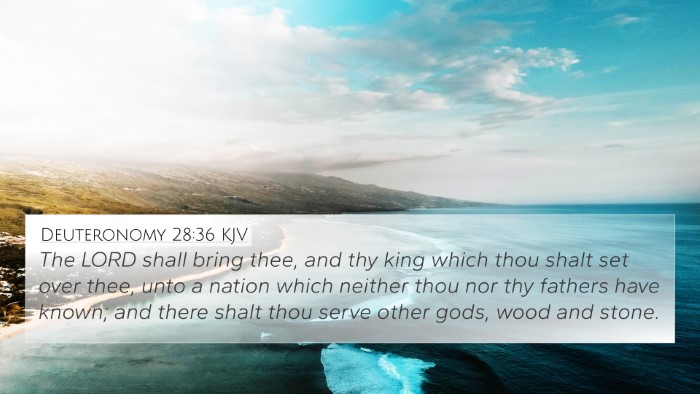Understanding 1 Samuel 12:25
The verse 1 Samuel 12:25 states:
"But if you shall still do wickedly, you shall be consumed, both you and your king."
Summary of the Verse Meaning
This verse occurs at a pivotal moment in the narrative of Israel's transition to monarchy, where the prophet Samuel reminds the people of their covenant responsibilities before God. The gravity of disobedience is emphasized, highlighting the accountability of both the people and their king.
Insights from Public Domain Commentaries
- Matthew Henry: Matthew Henry elaborates on the serious consequences of forsaking God. He emphasizes that disobedience not only endangers the individual but also impacts national leadership. The verse serves as a stern warning that the people's sin could lead to their downfall.
- Albert Barnes: Barnes contextualizes this warning in the light of Israel's desire for a king. He points out that choosing a monarch does not absolve the nation from adhering to God's laws. If they stray, both the citizens and their appointed leader will face divine judgment.
- Adam Clarke: Clarke offers a nuanced view by discussing the implications of “wickedly.” He notes that persistent wickedness indicates a refusal to heed divine correction. The fate of Israel is inexorably tied to their willingness to follow God's commands, which Clarke illustrates through historical examples from Israel's past.
Thematic Connections
The verse serves as a robust framework for understanding the themes of accountability, divine judgment, and the relationship between leadership and moral conduct in the Bible.
Cross-References to 1 Samuel 12:25
- Deuteronomy 28:15: This passage outlines the blessings for obedience and curses for disobedience.
- 2 Chronicles 7:14: A call for humility and repentance among God's people, showcasing the concept of communal responsibility.
- Romans 1:18-32: The principle of God’s wrath against ungodliness, illustrating the consequences of turning from righteousness.
- 1 Peter 4:17: A reminder that judgment begins at the house of God, linking worship and behavior to divine accountability.
- James 4:17: The moral obligation to do good, implying that neglecting this duty undermines one's relationship with God.
- Malachi 2:2: A warning against misguided leaders and a call for fidelity to God's commandments.
- Galatians 6:7: The principle of sowing and reaping, emphasizing that actions have consequences.
- Proverbs 14:34: Righteousness exalts a nation, while sin is a reproach to any people, reinforcing the connection between morality and governance.
- Psalm 9:17: The ultimate fate of those who forget God, akin to the warning given to Israel through Samuel.
- Hosea 4:6: The destruction of God's people for lack of knowledge, highlighting the need for understanding God's ways to avoid judgment.
The Importance of Cross-Referencing
Understanding 1 Samuel 12:25 within the broader context of Scripture can enhance our biblical literacy and provide deeper insights into its implications. Cross-referencing biblical texts is an essential tool for discovering connections, thematic parallels, and comprehensive interpretations.
Tools for Bible Cross-Referencing
- Bible Concordance: An essential tool that helps locate specific verses and reveals related texts.
- Bible Cross-Reference Guide: This resource aids in identifying various scripture references that link to a given verse.
- Cross-reference Bible Study: Engaging with multiple scriptures allows for a richer understanding of themes and doctrines.
- Bible Reference Resources: Various tools, including software and physical books, that provide cross-references to explore.
Utilizing Cross-References in Study
For those looking to deepen their understanding of Scripture, employing cross-referencing methods enables a significant exploration of biblical narratives and teachings. Here are some methods and tips:
- Identify key verses and themes, and then look for related passages that speak on similar topics.
- Engage in a comparative study of different biblical writings, such as the Gospels, Pauline epistles, and the Old Testament prophets.
- Create themed studies by linking verses related to a specific subject, enabling a more robust theological evaluation.
Conclusion
1 Samuel 12:25 serves as a cautionary reminder of the inherent responsibility borne by believers and leaders alike. By utilizing cross-referencing techniques and resources, individuals can uncover a wealth of knowledge that enhances their understanding of this verse and the broader teachings of Scripture.








